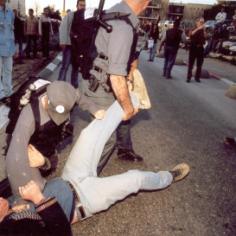
Police brutality and the harassment of demonstrators turn social protests into a risky mission.
Ahead of a committee discussion on the topic of police violence, the Association for Civil Rights in Israel wrote to the members of the Knesset’s Internal Affairs Committee to warn that in recent months, more and more reports have arrived detailing the illegal use of police authority that harms protestors’ and political activists’ freedom of speech.
In the letter, ACRI Attorney Sharona Eliahu-Chai and Alva Kolan list a series of reports that arrived at ACRI during the past year that raises concerns about serious police misconduct during demonstrations and protests, including the use of improper practices that illegally curtail the freedom to protest.
Reports reached ACRI about police officers conducting “warning conversations” with activists in the lead up to planned demonstrations that implied that those activists are “in the crosshairs.” Additional reports showed trends of dispersing protest vigils and legal demonstrations, the use of masked, plainclothes policemen or policemen without any identification tags, the arrest and detention of demonstrators without legal grounds, unjustified violence towards demonstrators, including the use of serious combat equipment such as tear gas and rubber bullets to disperse demonstrations.
ACRI Attorney Sharona Eliahu-Chai: the role of police in a democratic nation is to protect citizens’ freedom of expression and to permit political protests, not to intimidate protestors and social activists. Over the past two years, the Israeli public has become more socially and politically engaged. But instead of seeing it as a welcome development in the realization of society’s freedom of speech, police behaviour during protests discourages people from taking part in legitimate political protests and conveys an unacceptable message that taking part in them is essentially breaking the law.
Related Materials







